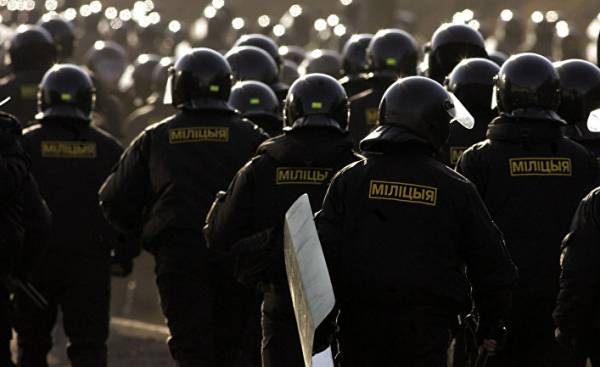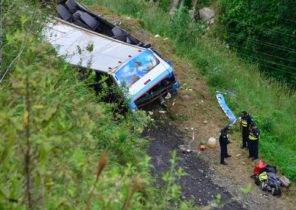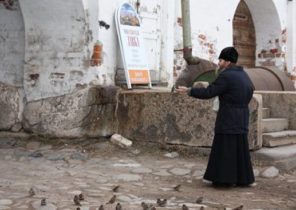
The harsh crackdown and mass arrests of peaceful demonstrators in Minsk, it seems, finally broke the illusion of a possible liberalization of the Belarusian regime.
In Belarus after a wave of civil protests that swept across the country, dozens arrested. Most of the detainees, including journalists and human rights activists, remain behind bars for another 10-15 days. Among them — the participant of demonstration, anarchist Mikalai Dzyadok, author of the book “colors of a parallel world”. He was detained and beaten by police in Minsk during a failed protest on March 25, and then taken to hospital with cherepno-a brain trauma and multiple injuries, where three days was in custody. Later, the court sentenced the Girl to 10 days of arrest.
A few days before the demonstration openDemocracy Russia spoke with an activist of the anarchist movement about how Belarusian society is struggling with marginalization, are there any prospects for the lifting of the decree on parasitism and ready the youngsters to come out of political apathy.
In 2010 Dziadok was sentenced for participating in direct action, and held in prison for nearly five years, was recognized as a political prisoner. 7 years later, according to the activist, in Belarus nothing has changed: the economic situation of the majority of citizens has only worsened, and the liberalization attempt, judging by recent arrests, failed miserably. However, the opposition never has a chance to change the rhetoric, given the social and economic agenda.
— A criminal case and a lawsuit against you and several political activists in 2010 was significant. Can you talk about the fact that the current apathy among young people is a direct result of such processes? What actions are taken against the anarchists that are actively fighting against the law of the parasites?
— I don’t think our process has had so large an impact on society. Politicized crowd he stirred, but nothing more. Repressive measures were applied and will be applied to anarchists everywhere. But in Belarus, in particular. We will try to suppress, to limit, to control. Well, the methods the state not so much: basically it’s detention, beatings and prison terms. What happened March 15, when it was detained about 40 anarchists (all of them the next day received 12 to 15 days of arrest) — another proof. I think it will continue. In Belarus anarchists are detained not because they hit the glass or fight with the police, but for the fact that they are anarchists.
— Amid the recent protests, many are discussing the possibility of revolution in Belarus, often citing the Ukrainian Maidan. But Belarusian society long enough is under the dictatorship. What do you think, is it possible to overcome the fear of instability, typical of many residents?
— During the years of the domination of the “social state” and “stability” values of the consumer society won in the minds of Belarusians complete victory over all other values. “The state and any public life, and we’re on our own” — this means the narrative and dominates the majority of Belarusian families, in the spirit of children.
The result is the atomization of society and the life of each of its members in a “bubble”, which reduces contact with others to a minimum. I have had a chance to read, as opposition journalists or politicians are trying to ask about the situation at the plant workers, who have reduced wages or worsened working conditions. And very often, paradoxically, those ignoring the opportunity to voice their problems, refuse to talk and get off the standard excuses: “we little people”, “we are not into politics” and so on. And the reason for this is not only the fear of repression, but also the example set by parents that the government is a powerful force, and any statements that might make her angry, should be avoided.
— How effective are these “soft” and “hard” methods?
— These efforts — even without the use of direct repression, bearing fruit. 10 years ago I was studying in Law College of the Belarusian state University. And at least 4 people from my group, which only had 25 people, were regular visitors to opposition rallies and cultural events. And despite the fact that at that time, one arrest at the rally could deduct from the school. Many of my friends from Minsk went to all the opposition rallies. Today, when repression for participation in street actions has become much weaker, they are barely going for 200-300 people, instead of a few thousand in a much more repressive times.
But at the protest on 15 March against the decree on “parasitism” was suddenly a lot of participants. It is obvious that the formal opposition is under considerable pressure. Given the large number of workers in enterprises and the public sector employees, whether it is time for the opposition to change tactics and your message? What opportunities exist for other groups?
For Belarusian society, which is stuck in time and needs change, it is critical to know the answer to the question: what is the reason that under seemingly favorable circumstances, the opposition and civil society is unable to motivate the population, primarily the youth, to fight against the regime and defend their rights?
To blame the failure on the one hand, the opposition and the issues that it raises. Belarus is in a state of permanent economic crisis. Wages are falling, prices are rising. Some of the enterprises are translated to incomplete working week. Grows and unemployment. The President and the Government respond by imposing a tax “for parasitism”, when everyone in the country who are not officially employed, is obliged to pay an annual tax under penalty of a fine or imprisonment for up to 15 days. Increase the cost of the power structure to quell potential protests.
Trying to mobilize the discontented to fight for social and labor rights, the opposition could succeed. But almost all of the dozens held over the past two years of protests relate exclusively to historical, cultural, ethnic and statist themes.
In Belarus, where the level of national consciousness is very small, the opposition consistently calling people to rallies in memory of the rebels of the Slutsk uprising of 1921 procession in memory of the dissolution of the Supreme Soviet in 1996, events like “the national flag Avenue”, with praise for Patriotic symbols.
The national agenda completely superseded the social, thereby cutting off the protests of a large number of people not interested in the fight for national values. One of the most characteristic examples of such tactics — the recent statement of the Belarusian popular front, the most recognizable opposition political party. When the country is already the third week of protests “against the law on parasitism”, BPF calls for mention on 12 March, the day of Belarusian icon, which is quite clear about their priorities and levels of understanding of the problems of the population.
The result of this is that last February, protests against the “law of laziness” the opposition and all political parties were represented minimally. The only youth group that openly declared itself in the protest were anarchists, not having an organizational structure and, moreover, to support large public organizations. It can be called a failure of the traditional opposition in mobilizing young people just where they are needed most.
Nevertheless, even such public resistance is faced with a kind of symbolic confrontation with the authorities. For example, recently the Belarusian TV showed the film “call a friend”, where there are suspicions that the protesters, including anarchists, receive foreign funding. What is your assessment of the effectiveness of this propaganda? How to deal with it?
I think its efficiency is very low. First, there are far fewer people than, for example, 10 years ago, get their news from television. This is mainly the older generation. The propaganda looks to the past, not the future. Young generation they had missed. Secondly, specifically the movie “phone a friend” quick and dirty in a hurry. He’s unconvincing, weak. Even in comparison with the same Russian propaganda. Well and, thirdly, the level of confidence in the government and what she says is low as ever. Therefore, such transfers are unlikely to convince anyone, rather, angry outright lies. On the other hand, to replicate this infamous video and the President’s statements, fear-mongering, helped just the same independent media. Thus, advocates were able to reach their audience, and without TV. It is because of this hysteria of the opposition leaders are planning a March on March 15, decided to conduct its proposed power trail and not on the Central streets, as they promised in just a few days before.
But it is worth noting that the distinction between “soft power”, implicitly shaping the values and outright propaganda in favor of the state and against the opposition, of course, quite thin.
Many evening TV programs public television include stories of happy families that settled on the good work at the state enterprise, the couple purchased the property at a preferential loan and is now enjoying the purchase of furniture and appliances, raising children. Constantly fueling the discursive field and the President: “Democracy is a government provided standard of living”. Or, speaking about the opposition: “…they need a riot! Riot in the Parliament, a riot in the square, fighting, sticks, logs, stakes in the window, to slaughter, to crush, to slaughter…”.
Daily rasskazyvayut Belarusian media about events in the world in a way that is beneficial to the Belarusian state. “Belarus today” newspaper with a circulation of 400 000 copies, while the population of Belarus is 9.5 million people, almost entirely filled with political news. Any disturbance, any protest anywhere in the world serves exclusively negative connotations. Continually drawn pictures of the horrific migrant crisis in the EU, though often with strong xenophobic overtones: the derision of the Western tolerance, gloating over the failures of multiculturalism and the tensions regarding the Islamic threat. All of these negative connotations carefully linked to the concepts of democracy and liberalism.
Notably the Titanic of the advocacy work done by the Belarusian media in connection with the events on the Maidan.
Since the revolution there was indeed followed by a considerable number of victims, the TV did everything to show that the blood and the civil war is a natural and inevitable result of the overthrow of the government that any instability is equal to the bloody chaos that the status quo is always better change. In every news broadcast, every “expert” comments in every speech of the President of the refrain was “Dissatisfied with the government? Want to be in Ukraine?”
Belarusians have developed a steady fear of revolutions, which now became associated with bombing, shooting, and mass murder. Now the conventional “average Belarusian”, thinking, better endure new humiliations on the part of government, rather than openly oppose it on the Belarusian independence.
— Uses the power of repression in an open form?
— The Arsenal of repressive actions by the state are commonplace. For young people — exclusion from the University following the arrest on opposition rallies. For older people — dismissal. If a person works in a state enterprise (the state in Belarus control most of the economy) is a direct reference to his head of the KGB, in the case that the private — can take place pressure on the Director of the company and blackmail through the incitement of the tax Inspectorate.
Actively used fines and imprisonment for up to 25 days. Against activists who openly “crossed the line” to prosecute, they receive prison sentences. Has long been disposing of organized political opposition, the repressive apparatus had the opportunity to be “proactive”, began active work against politicized youth movements: anti-fascists and football fans. The result of falsification of criminal cases or inflating to the level of ordinary criminal cases of administrative violations are now in prison are dozens of football fans from different Belarusian clubs. First and foremost, of course, there were those whose clubs during the Maidan and the ATO took the openly Pro-Ukrainian position.
— Belarus is often called “Europe’s last dictatorship” — the country is in relative political isolation and slowly deteriorating, it is often seen as an anomaly, isolated from the European processes. How in your opinion, Belarus fits into the global context?
Today’s the triumph of the populist, far-right and nationalists in several countries in Europe as well as the arrival of trump power in the United States — all this suggests that the danger of losing hard-won freedoms were still alive. Therefore, to dissect the experience of post-Soviet dictatorship at the hands of populist Lukashenko, can be extremely useful for those who live in the West, regarded as the Bastion of democracy.
Through electoral and political noise, especially in Eastern EU countries, we can already hear alarm bells. For example, the establishment of state control over the Constitutional court in Poland. Therefore, the fight against authoritarianism in Europe is not over. For the treatment of any illness need to see signs — including those who are 23 years of bloom in Belarus.
— It is interesting to note that throughout the post-Soviet space, the traditional engine of social change — students also seem to suffer from apathy. What is their position in Belarus? What obstacles-political activities exist?
Yes, apathy is characteristic of the student environment. I’ve heard from student activists that students are not fighting for their rights in the first place because they do not believe that he has some rights.
The desire to get an education and get a good job prevails over all other desires, and in the minds of young people completely missing the linking civic engagement with improvements in living standards. In educational institutions reduces the study of the Humanities, including history, which is inextricably linked with politics. Avoided study and even the mention of political ideologies. The education system works in such a way as to avoid the politicization of youth and the appearance of her critical thinking.
Quite active Pro-government Belarusian Republican youth Union, openly proclaiming itself the successor of Lenin Komsomol. They organize the event, which praised the current government and the “achievements” Lukashenko staged a mass attack of “trolls” on the Internet. Especially BRSM aktiviziruyutsya during the election period, does relaying the official rate of the Belarusian mass media and replicating the speech of the President.
In parallel, the Belarusian Republican youth Union is trying to divert young people from involvement in the protest of life. Exhortations, encouragements, cautions activists trying to distract the youth from politics, for example, organizing free concerts and discos are held on the days appointed for large opposition protests. For such activities, students often are driven by force, under threat of challenges at school.
Apathy and political passivity of the Belarusian youth is especially visible on the background of other Eastern European countries that have successfully fought both Soviet and post-Soviet dictatorships.
Belarus has experienced large-scale political cleaning in the 1930-ies: virtually the entire national intelligentsia, together with critically-minded Communists were destroyed. Now the Belarusian youth is no positive example of the struggle, the image of “fathers who won.”
During the Khrushchev thaw in Belarus was not a major dissident movement and prominent nationalist underground. Groups of Pro-independence and anti-Soviet intelligentsia began to appear only with perestroika, but even in the late 1980s, they failed to create a mass movement similar to the Polish “Solidarity” and Lithuanian sąjūdis. Yes, Belarus was a “popular Front”, but in mass he did not reach similar movements in other countries of the Soviet Union. The lack of successful examples from the past suppresses the will to resist and makes it more difficult for all opposition forces, recruiting new supporters.
— At the same time, there are signs that Belarusian youth are still trying to find his way into politics. She now realizes its power?
— Yes, it would be wrong to say that youth entirely dropped out of public life, leaving the desire to change something in the country.
Many young people changed the forms of expression and interaction with the political sphere. Together with the trend in the reduction of participants of street protests in recent years has clearly identified the trend of belarusianisation, and therefore some politicization — indeed, in Belarus the language issue is extremely politicized. Youth subculture and the growing popularity of community initiatives, at first glance, are not directly related to politics. As example, cultural events like the “Day shirts” or the concerts of Belarusian bands that are going today a lot more young people than in previous years.
Here, of course, a key role is played by the fact that such events rarely fall under the blow of state repression than the various rallies, pickets and marches — with the announcement of Lukashenka’s policy of “soft Belarusization” of the national paradigm has become more popular system.
In addition, continue to live and develop social initiatives with the environmental charity and anti-capitalist agenda: Food not bombs (Food not bombs), Premarket Critical mass. The first initiative is handing out free food to the homeless and the poor. Freemarket — realization of the idea of exchange of goods and services on a noncommercial basis. The movement of Critical mass, aimed at the greening of urban transport, has taken root in Minsk. However, despite their formal abolitionist, the state is still keeping an eye on such events.
The effectiveness of such cultural struggle in resisting the dictatorship — quite a controversial issue. But in times of perestroika it is the cultural circles of dissidents laid the Foundation of mass popular movements. And if the political parties, because of their legal status, to take control of a fairly simple, informal youth associations have always been and will be for the government a headache. Their unpredictability, decentralization and external impartiality may become — under certain conditions, of course — factor change.







